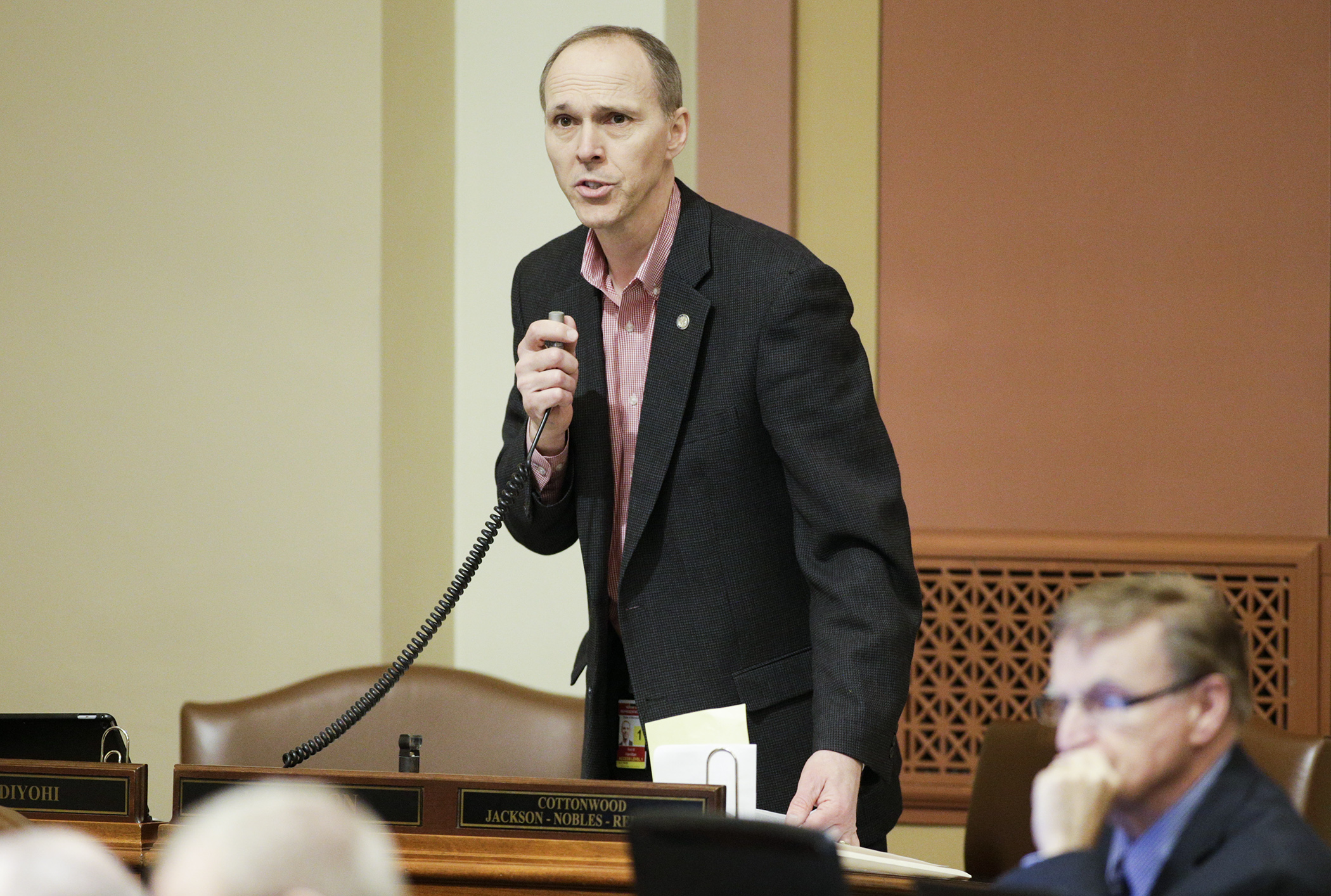House unanimously passes omnibus agriculture finance bill

Money for farmer-led councils that could prompt more buy-in to the state’s buffer program is included in the omnibus agriculture finance bill passed by the House 134-0 Wednesday.
Sponsored by Rep. Rod Hamilton (R-Mountain Lake), HF895/SF780* would appropriate more than $118 million in General Fund spending during the upcoming biennium to fund the Department of Agriculture, Board of Animal Health and Agricultural Utilization Research Institute.
As debate began, Hamilton successfully offered a delete-all amendment to insert the language of HF895.
The bill will now travel back to the Senate where Sen. Torrey Westrom (R-Elbow Lake) is the sponsor. It was passed 42-25 by that body March 30. A conference committee is expected to work out the differences.
After a brief outline of the bill’s contents, Hamilton’s request to fellow members was equally succinct.
“Friends, I would simply ask for your support,” he said.
While offering praise for the bill, and for Hamilton’s work, Rep. Jeanne Poppe (DFL-Austin) said the legislation could have been better with increases in funding for several programs and for the Department of Agriculture.
WATCH Full video of House Floor debate and passage of the omnibus agriculture finance bill
During committee hearings, agency officials expressed concern about funding in areas such as plant pathogens and pollinator decline, as well as increased operating costs that could impact their delivery of services.
However, Poppe ended her remarks by noting the bipartisan work that had been done and once again praising the result.
“Today, as we showcase the importance of agriculture, the members of Democratic-Farmer-Labor Party stand with our colleagues across the aisle in support of a good bill,” Poppe said.
Farmer councils
The appropriations include $1.5 million for grants to the farmer-led councils, which would work to develop best management practices and prioritized lists of projects to help improve water quality. By giving agricultural producers a louder voice in the process, proponents hope there will also be more buy-in as deadlines to implement buffers, or alternative water-quality practices, draw closer.
The funding would primarily be used to hire coordinators who would work with the councils to help farmers identify and take advantage of all the state resources and private help available. The groups may also help farmers create more customized solutions for individual situations.
Safety group established
The bill also includes language that would formally establish a Farm Safety Working Group. The 16-member organization would consist of government, agriculture and citizen members who would advise the department and Legislature on farm safety issues and coordinate improvement efforts.
What else would HF895 do?
The bill also includes measures that would:
- appropriate up to $2 million for the University of Minnesota to research the causes of avian influenza and prevention measures that can be taken;
- establish a new pollinator habitat and research account, and appropriate $500,000, for pollinator research work at the University of Minnesota that would include identifying best practices and establishing habitat beneficial to pollinators;
- require the Department of Agriculture to notify relevant media and post notice online when a weed on the state’s eradicate list is confirmed for the first time in a county;
- appropriate more than $2 million to streamline the food safety regulatory and licensing experience for regulated businesses and decrease inspection delinquencies;
- appropriate $1.1 million in grants to Second Harvest Heartland for the purchase of milk to distribute to food shelves and other charitable organizations;
- appropriate up to $1 million to develop and expand urban youth agricultural education and urban agriculture community development;
- expand and increase compensation for the Farm Advocates program, which provides one-on-one assistance to farmers facing a crisis due to financial or weather-related problems;
- appropriate $350,000 for reimbursement payments for destroyed or crippled livestock during Fiscal Year 2017;
- appropriate $250,000 to fund management of the industrial hemp pilot program; and
- appropriate $150,000 for the tractor rollover protection pilot program and eliminate the cost-share requirement for school’s that want to buy and install a rollover protective structure.
Related Articles
Search Session Daily
Advanced Search OptionsPriority Dailies
Ways and Means Committee OKs proposed $512 million supplemental budget on party-line vote
By Mike Cook Meeting more needs or fiscal irresponsibility is one way to sum up the differences among the two parties on a supplemental spending package a year after a $72 billion state budg...
Meeting more needs or fiscal irresponsibility is one way to sum up the differences among the two parties on a supplemental spending package a year after a $72 billion state budg...
Minnesota’s projected budget surplus balloons to $3.7 billion, but fiscal pressure still looms
By Rob Hubbard Just as Minnesota has experienced a warmer winter than usual, so has the state’s budget outlook warmed over the past few months.
On Thursday, Minnesota Management and Budget...
Just as Minnesota has experienced a warmer winter than usual, so has the state’s budget outlook warmed over the past few months.
On Thursday, Minnesota Management and Budget...